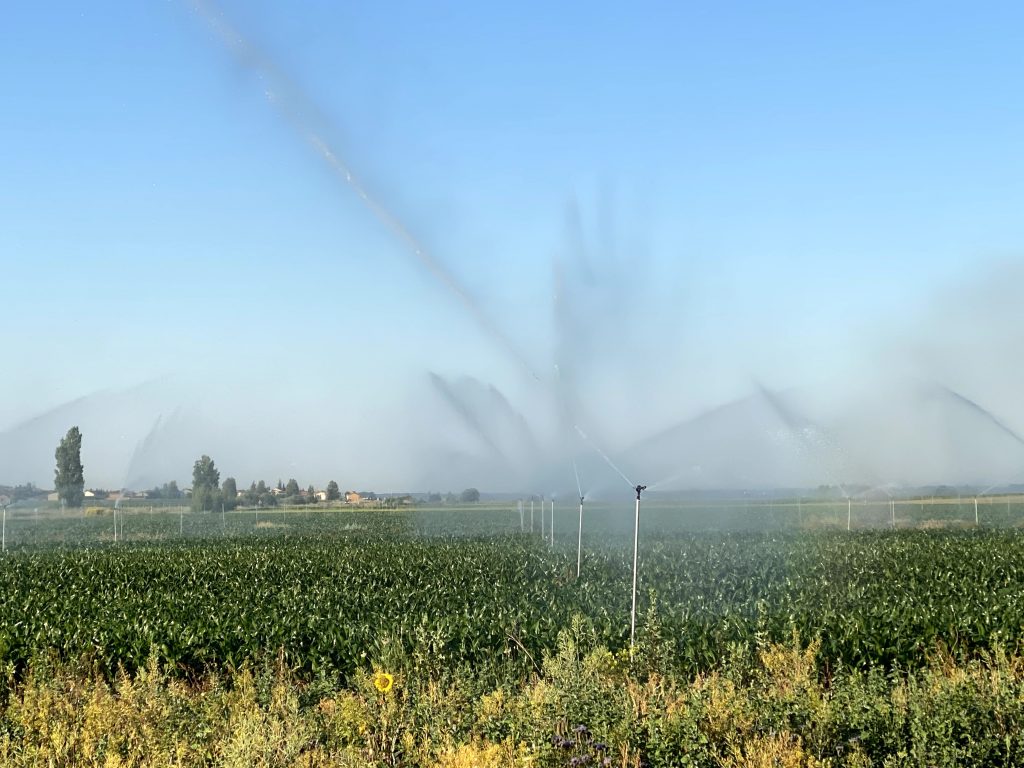
DEMETER aims to lead the Digital Transformation of the European Agrifood sector based on the rapid adoption of advanced technologies, such as Internet of Things, Artificial Intelligence, Big Data, Decision Support (DSS), Benchmarking, Earth Observation, etc., to increase performance in multiple aspects of farming operations, as well as to ensure the long-term viability and sustainability of the sector.
Looking at the DEMETER pilots, we can see many are aimed at reducing water, energy, pesticide and fertilizer usage. For example, in our Pilot ‘Cluster 1 Arable Crops’ we have several pilots tackling sustainability:
- The ‘Water & Energy Savings in Irrigated Crops’ pilot aims to optimise the irrigation of arable crops by improving the automation of irrigation zones, resulting in greater efficiencies in water and energy savings.
- ‘Smart Irrigation Service in Rice & Maize Cultivation’ aims to maximize water use efficiency in the rice–maize crop rotation system, through the deployment of appropriate sensor systems and science-based decision making. A nitrogen fertilisation advisory service is also provided by the pilot.
- ‘IoT corn Management and Decision Support Platform’ aims to implement an IoT Corn Decision Support System Platform for farmers to improve water management, including water quality, save energy and reduce greenhouse gas emissions.

DEMETER Pilot – Water and Energy Savings in Irrigated Crops
As such, one of the objectives within DEMETER is to establish a benchmarking mechanism for agriculture solutions and business, targeting end-goals in terms of productivity and sustainability performance of farms, services, technologies and practices. These Benchmarking and Performance Indicator Monitoring Tools aim to provide end-users with tools to evaluate the productivity and the sustainability of the practices adopted, as well as the efficacy of the developed digital solutions.
To provide a benchmarking system that can be used by all the DEMETER pilots, a minimum set of indicators covering pilots’ activities has been established and constraints relating to data availability at the farm level have been addressed. Based on these indicators, the Benchmark tools will provide feedback about the agronomic, environmental, and economic sustainability of the practices adopted and of the technologies delivered within DEMETER. The benchmark system will allow the comparison of farms through three different components: i) generic economic farm comparison (exploiting the data of FADN), ii) neighbouring benchmarking (a group of farms with similar environmental conditions and type of farming), and iii) technology benchmarking (to evaluate the impact of a specific technology).
This first list of environmental indicators has been collected with the aim of addressing relevant sustainability aspects and describing environmental concerns for agricultural production processes. Principal aspects taken into account have been farm biodiversity, the use of water for irrigation, the nutrient management, the use of agrochemicals in pest management.
For the use of water for irrigation we have selected: the irrigation water use efficiency (yield/irrigation water applied kg/mm), no irrigated area in the farm (% surface of the agricultural used area). For the use of agrochemicals in pest and disease management: pesticides usage (number of treatments/ha; number of treatments/crop), pesticide area in the farm (as proportion of farm agricultural used area), the pesticide use trends over time using data in terms of active ingredients. Inputs of nutrients, such as nitrogen and phosphorus, are essential to agricultural production but at the same time they represent a great threat to the environment. Common and easy-to-use indicators of nutrient use efficiency are: i) the measure of the nutrient input/output ratio; ii) the change in nutrient balance across the years.
By capturing this information, we can allow the farmer to assess the sustainability of their farm and how it performs against neighboring farms.


